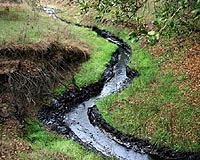| . |  |
. |
Geneva (AFP) May 29, 2009 Thirty-one countries still hold stockpiles of cluster munitions despite signing a treaty to ban them, according to a report by anti-arms lobby groups published on Friday. Britain, Germany and the Netherlands hold the largest stocks, said the report by Human Rights Watch and Landmine Action. Britain has 38.7 million submunitions which are used in cluster bombs, Germany holds 33 million and the Netherlands has 26 million, the report said. The three count among 96 countries that have inked the Convention on Cluster Munitions since it opened for signing last December. Seven countries have since ratified the treaty, which needs 30 ratifications to come into force. But while the signatory states of the treaty have committed to destroying the stockpiles, other countries holding significant stockpiles have not, according to campaign groups. The biggest volume of 730 million submunitions is held by the United States, which has not joined the treaty and is therefore not obliged to eliminate its stock. "The US is out of step with most of its major military allies," said Steve Goose, arms division director at Human Rights Watch. "There should be a NATO-wide policy not to use cluster munitions in joint military operations. The United States should not put treaty signatories in a position where they have to fight alongside US forces that use cluster munitions." According to the report, the total global stockpile of submunitions contained in the cluster bombs "likely number into the billions." Cluster munitions spread bomblets over a wide area from a single shell or bomb. The bomblets often do not explode on impact, but can do so later at the slightest touch. Therefore, they are just as deadly after a conflict as during. Seventeen countries including the United States, China and Russia are still producing cluster munitions this year even as lobby groups are pushing for them to ban these bombs, the campaign groups said.
Share This Article With Planet Earth
Related Links Our Polluted World and Cleaning It Up
 Polluted Ecosystems Can Recover
Polluted Ecosystems Can RecoverNew Haven CT (SPX) May 28, 2009 Most polluted or damaged ecosystems worldwide can recover within a lifetime if societies commit to their cleanup or restoration, according to an analysis of 240 independent studies by researchers at the Yale School of Forestry and Environmental Studies. Their findings will appear in the June edition of the journal PLoS ONE. The Yale researchers found that forest ecosystems recovered in 42 ... read more |
|
| The content herein, unless otherwise known to be public domain, are Copyright 1995-2009 - SpaceDaily. AFP and UPI Wire Stories are copyright Agence France-Presse and United Press International. ESA Portal Reports are copyright European Space Agency. All NASA sourced material is public domain. Additional copyrights may apply in whole or part to other bona fide parties. Advertising does not imply endorsement,agreement or approval of any opinions, statements or information provided by SpaceDaily on any Web page published or hosted by SpaceDaily. Privacy Statement |